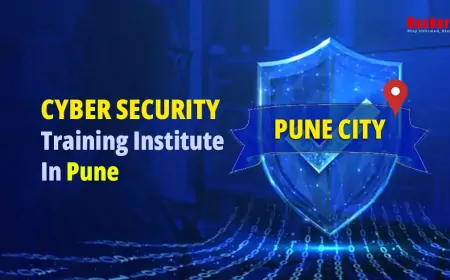What Skills Should You Master Before Launching a Cybersecurity Startup?
Picture this: It's 2025, and cyber threats are more sophisticated than ever. Ransomware attacks lock up businesses overnight, data breaches expose millions of personal records, and nation-state hackers probe critical infrastructure. In this high-stakes digital battlefield, starting a cybersecurity startup isn't just an opportunity it's a calling for those who want to make a real difference. But here's the catch: passion alone won't cut it. With the global cybersecurity market projected to reach $500 billion by 2030, competition is fierce, and failure rates for startups hover around 90%. As a founder, you need a toolkit of skills that spans technical expertise, business savvy, and interpersonal finesse. Whether you're a recent grad tinkering with ethical hacking or a seasoned IT pro eyeing entrepreneurship, mastering these skills can turn your idea into a thriving venture. In this post, we'll break it down step by step, explaining everything in simple terms so even beginners can follow along. Let's explore what it really takes to launch and succeed in the cybersecurity space.

Table of Contents
- Why Skills Matter in Cybersecurity Startups
- Essential Technical Skills
- Key Business Skills
- Crucial Soft Skills
- Legal and Regulatory Knowledge
- Marketing and Sales Expertise
- Financial Management Fundamentals
- Building and Leading a Team
- Continuous Learning and Adaptability
- Conclusion
- FAQs
Why Skills Matter in Cybersecurity Startups
Starting a cybersecurity company is like building a fortress while under siege. You need to protect others from digital dangers, but first, arm yourself with the right abilities. In 2025, the industry faces a talent shortage of over 3.5 million professionals, making skilled founders even more valuable. But why focus on skills before launching? Simply put, they bridge the gap between idea and execution.
Technical skills ensure your product or service is robust think detecting intrusions or securing networks. Business skills help you navigate funding, marketing, and scaling. Soft skills like communication turn complex threats into understandable advice for clients. Without these, even the best idea fizzles. I've talked to founders who regretted skipping basics, like understanding regulations, only to face hefty fines. Mastering skills upfront saves time, money, and headaches. Plus, in a field evolving with AI and quantum threats, staying skilled keeps you ahead.
Remember, cybersecurity isn't just tech; it's trust. Clients bet their data on you, so prove your worth through competence. As we dive deeper, we'll cover each category, with tips on how to learn them affordably.
Essential Technical Skills
At the heart of any cybersecurity startup are technical skills the tools to build, test, and deploy secure solutions. Don't worry if you're not an expert yet; many start with basics and build up.
First, networking and system administration. Understand how data flows across devices, routers, and servers. This helps spot vulnerabilities, like weak points in a company's Wi-Fi. Learn through free online tutorials or certifications like CompTIA Network+.
Next, programming. Languages like Python are gold for automating tasks, such as scanning for threats. Scripting lets you create custom tools, say, a bot that alerts on suspicious activity. Start with beginner courses on platforms like Codecademy.
Incident response is crucial handling breaches when they happen. Know how to isolate affected systems, analyze logs (records of events), and restore operations. Practice with simulations on sites like TryHackMe.
Cloud security is booming as businesses move online. Master platforms like AWS or Azure, focusing on encryption (scrambling data) and access controls. With cloud attacks up 75% last year, this skill sets you apart.
Penetration testing, or ethical hacking, simulates attacks to find weaknesses. Tools like Metasploit help, but ethics matter get certified as a Certified Ethical Hacker (CEH).
Finally, cryptography and AI/ML basics. Cryptography secures data transmission; AI detects patterns in threats. These are advanced but essential for innovative startups. Blend them to create AI-driven security products.
Building these takes time aim for hands-on projects, like securing a personal server. They'll form your startup's technical foundation.
Key Business Skills
Technical prowess gets you started, but business skills keep you going. Many tech founders flop here, so prioritize them early.
Market research: Identify needs. Survey potential clients small businesses often lack basic protections. Tools like Google Forms help gather data on pain points, like ransomware fears.
Business planning: Craft a roadmap. Outline your niche, services (e.g., vulnerability assessments), and revenue models (subscriptions vs. one-offs). Use templates from SCORE.org.
Funding knowledge: Bootstrap or seek investors? Understand pitches highlight your unique value, like affordable AI tools for SMEs. Platforms like AngelList connect you with backers.
Operations management: Run efficiently. Learn project management with tools like Trello for tracking client audits.
Scalability: Design for growth. Cloud-based services expand easily without huge upfront costs.
These skills turn tech into profit. I've seen founders pivot from consulting to products by mastering business basics, boosting revenue tenfold.
| Skill Category | Key Examples | Why It's Essential |
|---|---|---|
| Technical | Networking, Programming, Cloud Security | Builds reliable products/services |
| Business | Market Research, Funding, Planning | Ensures viability and growth |
| Soft | Communication, Problem-Solving | Fosters client trust and team cohesion |
Crucial Soft Skills
Soft skills are the glue holding everything together. In cybersecurity, where explaining risks to non-techies is key, they're indispensable.
Communication: Translate jargon into plain English. Clients need to grasp why multi-factor authentication (extra login steps) matters. Practice by blogging or presenting at meetups.
Problem-solving: Threats are puzzles. Analyze, hypothesize, test skills honed through riddles or coding challenges.
Adaptability: Tech changes fast; quantum computing looms. Stay flexible, learning new tools quickly.
Leadership: Inspire your team. Delegate tasks, motivate during crises. Books like "The Lean Startup" teach this.
Emotional intelligence: Read people, manage stress. In high-pressure breaches, calm heads prevail.
These aren't taught in class but developed through experience. Join communities like ISC2 for networking and growth.
Legal and Regulatory Knowledge
Ignoring laws can sink your startup. Understand frameworks like GDPR (EU data privacy) or HIPAA (US health data).
Compliance consulting is a niche help clients meet standards. Learn via online courses.
Intellectual property: Protect your innovations with patents.
Risk management: Assess legal exposures, get insurance.
In 2025, with AI regulations emerging, this knowledge differentiates you.
Marketing and Sales Expertise
Great products need buyers. Master digital marketing SEO for your site, content on LinkedIn about threats.
Sales: Pitch value, not features. "We'll cut breach risks by 50%" sells better.
Build trust with case studies. Tools like HubSpot CRM track leads.
Networking at conferences lands clients. In cybersecurity, relationships are key.
Financial Management Fundamentals
Money mishaps doom startups. Budget wisely track expenses with QuickBooks.
Pricing: Competitive yet profitable. Factor costs like software licenses.
Forecasting: Project revenues. Understand metrics like CAC (customer acquisition cost).
Tax basics: Deduct business expenses. Consult accountants early.
Building and Leading a Team
Solo starts are fine, but growth needs talent. Hire for gaps sales if you're tech-heavy.
Culture: Foster collaboration, learning. Remote work tools like Slack help.
Retention: Offer growth opportunities in this shortage-hit field.
Lead by example, encouraging innovation.
Continuous Learning and Adaptability
Cybersecurity never stops evolving. Commit to lifelong learning podcasts, webinars, certifications.
Track trends like zero-trust (no automatic trust) or AI threats.
Adapt business models; pivot if needed.
This mindset turns challenges into opportunities.
Conclusion
Launching a cybersecurity startup in 2025 demands a blend of technical, business, and soft skills. From mastering networking and programming to honing communication and financial acumen, each piece builds a resilient foundation. Remember, it's not about perfection but progress start small, learn continuously, and focus on solving real problems. With the industry booming amid rising threats, skilled founders have immense potential. Take stock of your abilities, fill gaps, and step forward. Your startup could safeguard countless businesses. Ready to begin? Assess one skill today and build from there.
FAQ
What Technical Skills Are Most Important for a Cybersecurity Founder?
Networking, programming (like Python), incident response, cloud security, and penetration testing are key to building secure solutions.
Do I Need a Degree to Start a Cybersecurity Company?
No, but certifications like Security+ or CEH provide credibility and knowledge.
How Important Is Business Planning?
Vital it outlines your path, attracts investors, and helps navigate challenges.
What Soft Skills Should I Focus On?
Communication, problem-solving, adaptability, leadership, and emotional intelligence for client relations and team management.
Why Learn About Regulations?
To ensure compliance, avoid fines, and offer services like GDPR consulting.
How Can I Learn Marketing for My Startup?
Start with free resources on SEO, content marketing, and use platforms like LinkedIn.
What Financial Skills Are Needed?
Budgeting, pricing, forecasting, and basic accounting to manage cash flow.
How to Build a Team?
Hire for complementary skills via LinkedIn or freelancers, foster a positive culture.
Is Continuous Learning Essential?
Yes, with rapid tech changes, stay updated through courses and industry news.
What If I Lack Technical Skills?
Partner with experts or learn basics via online platforms before launching.
How to Handle Funding?
Bootstrap, seek grants, or pitch to investors with a solid business plan.
What's the Role of AI in Cybersecurity Skills?
Understanding AI helps in threat detection; learn basics for innovative products.
Can Soft Skills Be Learned?
Absolutely, through practice, books, and real-world interactions.
How to Identify Market Needs?
Conduct surveys, analyze trends, and talk to potential clients.
What About Risk Management?
Assess threats to your business and clients; it's core to cybersecurity.
Is Networking Important for Founders?
Yes, for clients, partners, and insights at events or online.
How Long to Master These Skills?
6-12 months for basics, but ongoing for advanced ones.
What Tools for Learning?
Coursera, Udemy, TryHackMe for tech; books for business.
Can I Start Solo?
Yes, many do, then scale with hires as you grow.
What's the Biggest Challenge?
Balancing tech expertise with business demands; prioritize both.
```
What's Your Reaction?










































































